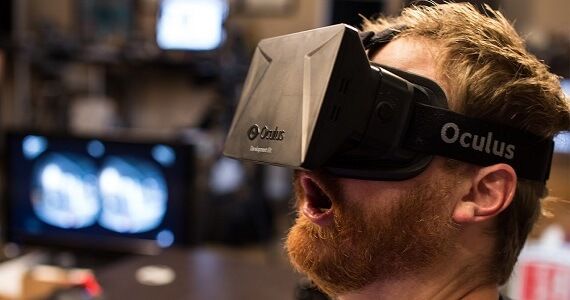If you believe that Facebook's acquisition of Oculus VR for $2 billion wasn't a good idea for the future of virtual reality gaming, you're not alone. Celebrity developer Markus 'Notch' Persson of Minecraft had announced soon after the deal was made that he was no longer going to work with Oculus VR because of Facebook's involvement. While many other fans of the VR tech are furious about the sale, with many of them wanting a refund on their Kickstarter donations, the deal will make more sense in a year or so. At least, that's what Palmer Luckey, creator of Oculus Rift, said at PAX East.
21-year-old Luckey tells Hip Hop Gamer that he would have been skeptical about the deal as well if he had not known more about it, explaining that before the deal went through, many potential employees were worried about coming onto Oculus VR, because it was a high-risk start up with very little backing to promote stability. But now that they have the support of Facebook, Oculus VR is in a position to hire whoever it needs. They certainly have the money to pick and choose from the talent pool.
He explained a further benefit of Facebook buying Oculus VR (which will remain autonomous of Facebook) is the ability to build their own custom parts, instead of recycling old smartphone parts to build the headsets. This allows for a better, higher-quality and streamlined hardware device. Facebook's backing also gets AAA developers even more excited about the now-apparent longevity of virtual reality, allowing them to develop for the platform in confidence. Currently, 85,000 Oculus Rift dev kits have been sold so that's all developers have to go on until the VR headset becomes a mainstream consumer product.
[HTML1]
With the influx of cash, Luckey also teased the idea of signing deals with independent studios to fund games for the platform, the first of those deals will be closing "really soon." Luckey is certain that these advantages will sway consumers to agree with him.
"...If people give us some time, I think they'll agree with us. A year from now, everyone--I think even a lot of the doubters, will look and say 'You know what, they really did make the best choice.'"
The Oculus Rift headsets will be sold at cost, when they go on sale. Luckey gave the example that, if the headset costs $200 dollars to make, it will be sold for $200. However, there is no official price point or release date of the consumer headsets. Of course, the development kits are available now for $350.
At the end of the interview, Luckey addressed the impending competition: Sony's Project Morpheus, which was announced just two days before news of the Facebook deal made waves. Luckey believes that Project Morpheus is not a true competitor, as Sony is catering to only PS4 consumers, while Oculus VR is aimed at a much wider audience, claiming that Zuckerberg and he have the same dream of making virtual reality mainstream, available to everyone across multiple platforms.
"I think Morpheus is less competitive because it's for PlayStation 4. They're trying to sell to their people and we're trying to sell to PC gamers and maybe mobile later on as it gets more powerful. Even if we were competing, I just think we have the best technology and the best team. But I am really excited that they're doing a pretty good job."
While the interview seems promising, there will definitely be some people who aren't happy about the decision to "sellout" to a huge corporate identity that makes money off of advertising and user data, some even downright furious. The explanations and business plan ideas that Luckey is pitching are promising, and with rumors squashed that Facebook will be rebranding Oculus VR (they won't be), hopefully the the future of VR tech, the Facebook backing won't affect loyalty in the masses like it did for Notch.
Are you satisfied with the explanation of Oculus VR's direction? Are you considering getting a Rift headset when it hits the market?
Source: Gamespot

